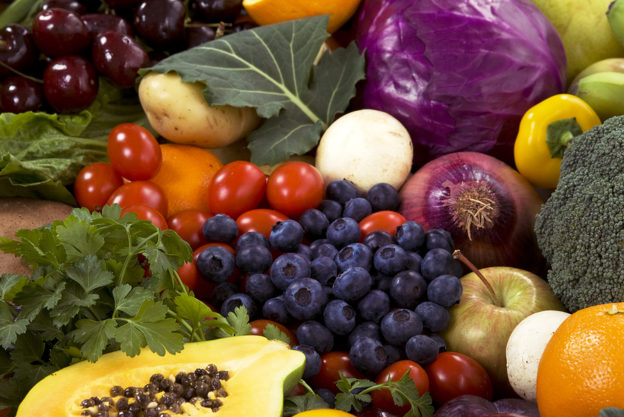By David Blyweiss, M.D., Advanced Natural Wellness
September 4, 2020
Is it really worth it to spend extra money on organic produce?
It’s a question I get asked all the time. My reply is pretty simple. Yes! In fact, when you consider the long term health risks, buying organic is going to save you thousands of dollars per year.
This might seem like a pretty strange statement since organic foods typically cost 47 percent more.[1]
But buying organic fruits and vegetables is more than just a growing trend in our society. There are several key benefits.
- It’s a way to support family farming methods which are healthier for our planet’s soil and water supply.
- Organic foods often tastes better! Just think of that delicious and sweet flavor you get from the organic berries at the roadside market.
- The nutritional value is better too. In fact, a 2014 analysis by the British Journal of Nutrition found that organic crops contained higher levels of antioxidants compared to non-organic varieties. [2]
This is all well and good, but let’s get to the root of the issue…
Chemicals Use in Non-Organic Produce May Be Killing You
Here’s the #1 reason why you need to start buying organic produce. It’s so you can avoid the dangerous herbicides and pesticides that are sprayed on our crops every year.
MD Exposes the Hidden Danger to Your Eyes

When your eyesight starts to fail, it's a real problem. Suddenly you can't go to the grocery store... you can't get to the doctor if you have an emergency... you can't meet your friends for dinner…
Your "regular" doctor doesn't have time to keep up with the latest research. And the same goes for eye doctors. They go to school to learn how to fit you for glasses and contacts, but have no way of preventing the damage and loss of eyesight that threatens your freedom and independence.
Let me show you something that explains a LOT about how your eyes work.
In my FREE Special Report, I'll show you a HUGE, untapped resource for your eyes that safely and naturally restores clear, effortless eyesight.
Click here to get started...
One of the most dangerous of these culprits is an herbicide called glyphosate – commonly contained in Roundup. Perhaps you’ve used Roundup in your own vegetable garden to keep the weeds at bay.
Bayer, the company who owns Roundup, wants you to think it’s safe. But studies tell a different story. One such source says, “Roundup was by far the most toxic among the herbicides and insecticides tested.” [3]
Among the various health concerns with this chemical, the glyphosate found in Roundup can:
- Wreak havoc with your gut microbiome. It kills off the “good bacteria” you need and allows pathogens to thrive.[4]
- Interrupts how your body uses important minerals like iron, cobalt, and manganese.[5]
- Interferes with the creation of amino acids your body needs.[6]
- Contributes to the formation of non-Hodgkin’s lymphoma – a dangerous form of cancer.
In fact, Bayer recently agreed to pay more than $10 billion in settlements. This money went to tens of thousands of people who claimed Roundup led to their lymphoma cancer. [7]
Then, in Ecuador, people with high glyphosate exposure where 4.8 times more likely to suffer miscarriages or deliver babies with birth defects. [8]
In 2019, Austria tried to become the first country in the EU to officially ban the use of glyphosate. But the law was blocked by a last minute technicality.[9]
Across the globe, glyphosate is still a big problem. Big name companies fight against health-concerned citizens who want the substance banned.
Just remember, glyphosate is just one of the problems. Non-organic or GMO foods come with other risks too. According to a New Zealand study, genetically modified (GMO) crop-related herbicides have been linked to antibiotic resistance.[10]
There are other serious health risks from GMOs. These include infertility, lung damage, cancer, immune impairment, vitamin D deficiency, premature aging, higher rate of mortality, liver problems and kidney disease.
So, you can clearly see… all of those health risks will cost a pretty penny more in treatment than the few extra dollars you’ll spend each week buying organic fruits and vegetables.
Here’s a Buying Strategy That Won’t Break the Bank
The World's Quickest Solution for Ending Prostate and Urinary Misery
This has recently been revealed to be one of the only real breakthroughs in prostate health.
The seeds of a strange fruit (sometimes called "Chinese Apples") hold powerful phytonutrients that are a revolution in prostate health.
In fact, UCLA and Veterans Administration research have now proved this to be true.
Not only that, but it may be the worlds quickest solution for ending prostate misery.
Simply stated, these phytonutrients represent a huge step beyond beta sitosterol, saw palmetto, and other phytosterols alone.
Simply click HERE if you want to have fast prostate relief...restful, uninterrupted sleep...no more constant "urges to go"...enhanced virility...and optimal prostate support for life.
Making an immediate switch to buying only organic might make you feel a little uncomfortable. That’s why I suggest you start with the most important fruits and veggies and build your way up.
The Environmental Working Group (EWG) is a non-profit organization that releases a yearly report called the “Dirty Dozen.” This resource explains which fruits and veggies typically pose the greatest risk of chemical poisoning.[11]
I suggest you follow their recommendations closely. Start your organic buying adventure by focusing on strawberries, spinach, kale, nectarines, apples, grapes, peaches, cherries, pears, tomatoes, celery, and potatoes.
This will give you a great start in eliminating dangerous chemicals from your dinner table. The EWG also shares a list of the “Clean Fifteen” or those produce products that are the safest to eat even when commercially grown.
This includes foods like avocados, sweet corn, pine apples, onions, eggplants, asparagus, cauliflower, and broccoli. Check out the complete list on their site. [12]
You can also look for produce stickers at the grocery store that are five-digits long and begin with the number 9. Just stay away from 5-digit codes starting with 8, because this indicates a food has been genetically modified.
And one last thing; while the cost of organic plant based foods is higher than non-organic, the benefits down the road more than make up for it.
Sources:
[1] Consumer Reports, “The cost of organic food,” Available online: https://www.consumerreports.org/cro/news/2015/03/cost-of-organic-food/index.htm
[2] Barański, Marcin, et al. “Higher Antioxidant and Lower Cadmium Concentrations and Lower Incidence of Pesticide Residues in Organically Grown Crops: a Systematic Literature Review and Meta-Analyses.” British Journal of Nutrition, vol. 112, no. 5, 2014, pp. 794–811., doi:10.1017/S0007114514001366.
[3] Article ID 179691*R. Mesnage et al., Biomed Research International, Volume 2014 (2014)
[4] Samsel, Anthony, and Stephanie Seneff. “Glyphosate, pathways to modern diseases II: Celiac sprue and gluten intolerance.” Interdisciplinary toxicology vol. 6,4 (2013): 159-84. doi:10.2478/intox-2013-0026
[5] Robert J. Ganson, Roy A. Jensen,The essential role of cobalt in the inhibition of the cytosolic isozyme of 3-deoxy-d-arabino-heptulosonate-7-phosphate synthase from Nicotiana silvestris by glyphosate, Archives of Biochemistry and Biophysics,Volume 260, Issue 1,
1988,Pages 85-93,ISSN 0003-9861,https://doi.org/10.1016/0003-9861(88)90427-4. (http://www.sciencedirect.com/science/article/pii/0003986188904274)
[6] Vivancos, Pedro Diaz et al. “Perturbations of amino acid metabolism associated with glyphosate-dependent inhibition of shikimic acid metabolism affect cellular redox homeostasis and alter the abundance of proteins involved in photosynthesis and photorespiration.” Plant physiology vol. 157,1 (2011): 256-68. doi:10.1104/pp.111.181024
[7] Cohen, Patricia. “Roundup Maker to Pay $10 Billion to Settle Cancer Suits,” New York Times, 24June2020, Available online: https://www.nytimes.com/2020/06/24/business/roundup-settlement-lawsuits.html
[8] Paz-y-Miño C, Muñoz MJ, Maldonado A, et al. Baseline determination in social, health, and genetic areas in communities affected by glyphosate aerial spraying on the northeastern Ecuadorian border. Rev Environ Health. 2011;26(1):45-51. doi:10.1515/reveh.2011.007
[9] Murphy, Francois, “Austrian leader blocks ban on weedkiller glyphosate, citing technicality,” Reuters, 9Dec2019, Available online: https://www.reuters.com/article/us-austria-glyphosate/technicality-bars-austrian-ban-on-weedkiller-glyphosate-from-taking-effect-idUSKBN1YD11Z
[10] Kurenbach B et al (2017). Herbicide ingredients change Salmonella enterica sv. Typhimurium and Escherichia coli antibiotic responses. Microbiology, 17 November 2017. doi: 10.1099/mic.0.000573
[11] Environmental Working Group, “Dirty Dozen,” 2020. Available online: https://www.ewg.org/foodnews/dirty-dozen.php
[12] Environmental Working Group, “Clean Fifteen,” 2020. Available online:







